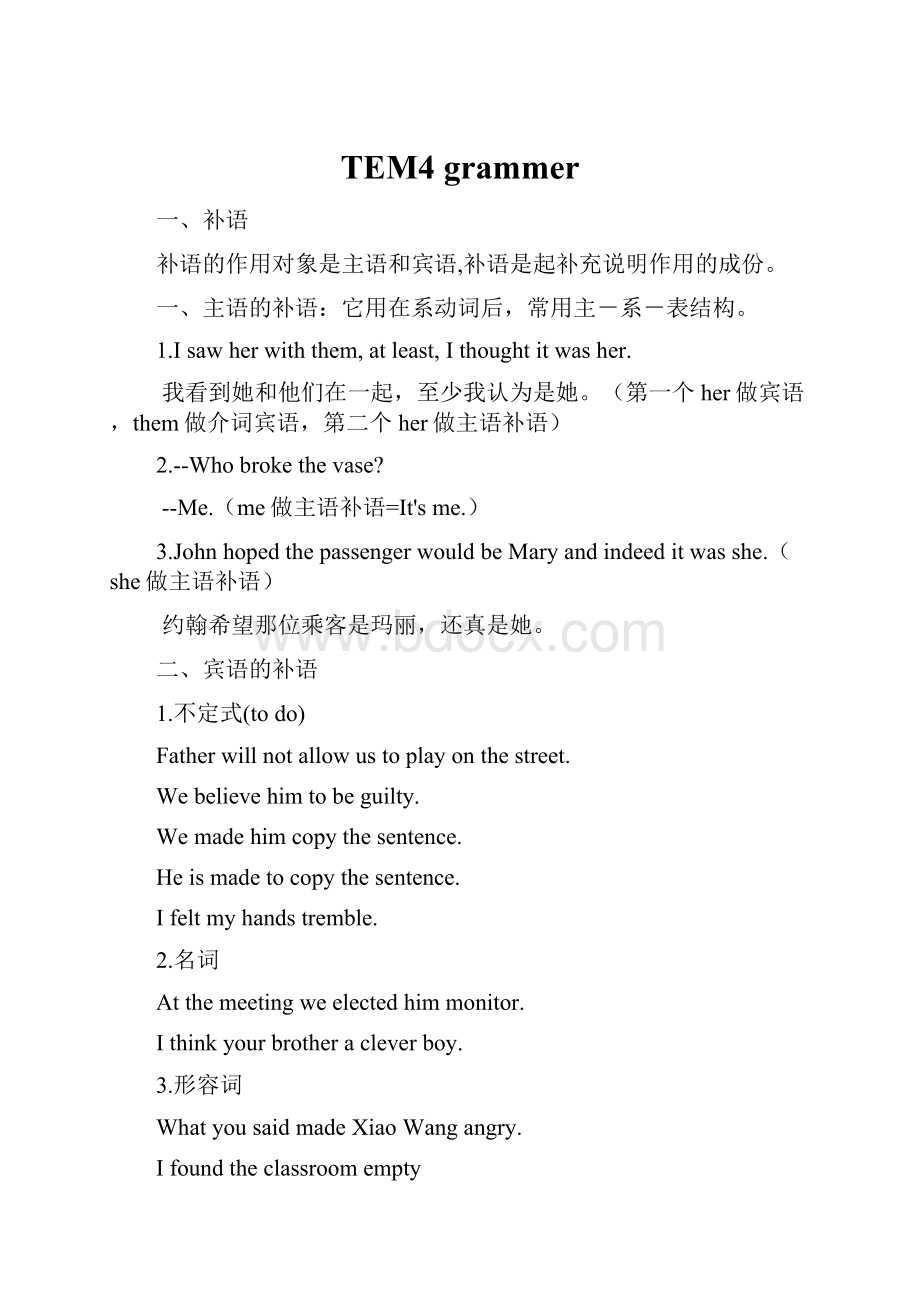TEM4 grammer.docx
《TEM4 grammer.docx》由会员分享,可在线阅读,更多相关《TEM4 grammer.docx(24页珍藏版)》请在冰豆网上搜索。

TEM4grammer
一、补语
补语的作用对象是主语和宾语,补语是起补充说明作用的成份。
一、主语的补语:
它用在系动词后,常用主-系-表结构。
1.Isawherwiththem,atleast,Ithoughtitwasher.
我看到她和他们在一起,至少我认为是她。
(第一个her做宾语,them做介词宾语,第二个her做主语补语)
2.--Whobrokethevase?
--Me.(me做主语补语=It'sme.)
3.JohnhopedthepassengerwouldbeMaryandindeeditwasshe.(she做主语补语)
约翰希望那位乘客是玛丽,还真是她。
二、宾语的补语
1.不定式(todo)
Fatherwillnotallowustoplayonthestreet.
Webelievehimtobeguilty.
Wemadehimcopythesentence.
Heismadetocopythesentence.
Ifeltmyhandstremble.
2.名词
Atthemeetingweelectedhimmonitor.
Ithinkyourbrotheracleverboy.
3.形容词
WhatyousaidmadeXiaoWangangry.
Ifoundtheclassroomempty
4.副词
Pleasecallthestudentsbackatonce.
Hewasseentotakehiscapoff.
5.现在分词
Wehearhimsinginginthehall.
Ifoundhimlyinginbed,sleeping.
6.过去分词
Hesawhisfacereflectedinthewater.
二、谓语单复数
谓语动词用单数
3.一般用and连接的两个单词或短语做主语时候,谓语用复数,但是下面用and连接的主语表示一个概念,谓语用单数:
lawandorder法制;soapandwater肥皂水;acupandsaucer茶杯碟子forkandknife刀叉theneedleandthread针线trialanderror反复尝试,不断摸索horseandcarriage马车timeandtide岁月breadandbutter奶油面包theebbandflow盛衰,潮涨潮落如:
Iflawandordernotpreserved,neitherthecitizennorhispropertyissafe.
4.表示学科和某些疾病名称的名词是复数形式,作主语时候谓语动词用单数形式Linguisticsisabranchofstudyonhumanlanguage.
5.有些名词形式上是复数,意义上是单数,根据意义一致原则动词用单数Thechaoswasstoppedbythepolice
Thenewsisagreatencouragementtous
Aseriesofdebatesbetweenthelectureswasscheduledforthenextweekend.
6.用and连接的成份表示一个单一概念时候,动词谓语用单数形式BreadandbutterisourdailyfoodTimeandtidewaitsfornoman
二.谓语用复数
2.集体名词police,public,militia,cattle,class,youth后常用复数形式的动词
TheChinesepeoplearebraveandhardworking
Thecattlearegrazinginthesunshine
3.当表示民族的词与冠词合用当主语,谓语动词用复数形式
TheJapanesewereonceveryaggressive
5.不可数名词作主语,其前有表示数量的复数名词修饰时,谓语动词用复数
Threemilliontonsofcoalwereexportedthatyear
三.谓语动词可用单数,也可以用复数的情况
1.就近一致原则
1)either…or…;neither…nor…;whether…or…;notonly…but(also);or
Neithermoneynorfamehasinfluenceonme
Notonlyyoubutalsoheiswrong
2)在倒装结构中,谓语动词与后面的第一个主语一致
Blockingtheopen-sidedporch,framedbytheenvelopingfog,standsatallgrave-facedpoliceman.
Justoutsidetheruinsisamagnificentbuildingsurroundedbytalltrees.
2.就前原则
(together/along)with,suchas,accompaniedby,aswellas,nolessthan,except,besides,with,combinedwith,inadditionto,including,togetherwith
Thepresidentofthecollege,togetherwiththedeans,isplanningaconferenceforthepurposeoflayingdowncertainregulations.
3.关系代词做主语的定语从句中,谓语的数要与先行词一致。
Despitemuchresearch,therearestillcertainelementsinthelifecycleoftheinsectthatarenotfullyunderstood.
Therearemanyvaluableserviceswhichthepublicarewillingtopayfor,butwhichdonotbringareturninmoneytothecommunity.
4.一些表示数量的短语与名词连用时候,谓语动词的数取决于名词的数,名词是复数,谓语动词用复数,反之就用单数。
alotof/lotsof;plentyof/heapsof;halfof;two-third(three-fourth…)of;eighty(ten,twenty…)percent;partof;restofnoneof等等
Two-thirdsofpeoplepresentarewomen
Lotsofdamagewascausedbythefire
5.集体名词作主语时,当表示整体时候,用单数;当强调集体中的个体时候,用复数。
army,audience,band,government,group,flock,police,public,staff,team,troop.Crowd,firm,family
Thefamilyisthebasicunitofoursociety
ThefamilywerewatchingtheTVTheaudiencewasenormous
Theaudienceweregreatlymovedatthewords
6.某些固定结构中主语与谓语的数:
第一组:
agreatmany+可数复数复
anumberof+可数复数复
themajorityof+可数复数复
第二组;
each/every+可数复数单
neither/eitherof+可数复数单
oneandahalf+可数复数单
第三组;
morethanone+可数单数单
manya+可数单数单
注意比较:
Morestudentsthanonehavebeenreferredto
Morethanonestudentisgoingtobuythisbook
三、反义疑问句
陈述句部分是否定结构,反意疑问句部分用肯定式提问时,回答的yes要译成“不”,no要译成“是”。
—Hissisterdidn’tattendthemeeting,didshe?
他妹妹没有参加会议,是吗?
—Yes,shedid./No,shedidn’t.不,她参加了。
/是的,她没参加。
1)I,aren'tI.
I'mastallasyoursister,aren'tI?
2)wish,may+主语。
Iwishtohaveawordwithyou,mayI?
4)含有oughtto的反意疑问句,陈述部分是肯定的,疑问部分用shouldn't/oughtn't+主语。
Heoughttoknowwhattodo,oughtn'the?
/shouldn'the?
6)usedto,didn't+主语或usedn't+主语。
Heusedtotakepicturesthere,didn'the?
/usedn'the?
7)hadbetter+v.hadn'tyou?
You'dbetterreaditbyyourself,hadn'tyou?
8)wouldrather+v.,wouldn't+主语。
Hewouldratherreadittentimesthanreciteit,wouldn'the?
9)You'dliketo+v.wouldn't+主语。
You'dliketogowithme,wouldn'tyou?
10)must的疑问句,疑问部分根据实际情况而定。
Hemustbeadoctor,isn'the?
YoumusthavestudiedEnglishforthreeyears,haven'tyou?
/didn'tyou?
Hemusthavefinishedityesterday,didn'the?
11)感叹句中,用be+主语。
Whatcolours,aren'tthey?
12)neither…nor,either…or连接的并列主语时,疑问部分根据其实际逻辑意义而定。
NeitheryounorIamengineer,arewe?
13)everything,that,nothing,this,疑问部分主语用it。
Everythingisready,isn'tit?
14):
a.并列复合句疑问部分,谓语动词根据邻近从句的谓语而定。
Mr.SmithhadbeentoBeijingforseveraltimes,heshouldhavebeeninChinanow,shouldn'the?
c.上述部分主句谓语是think,believe,expect,suppose,imagine等引导的定语从句,疑问部分与宾语从句相对应构成反意疑问句。
Idon'tthinkheisbright,ishe?
Webelieveshecandoitbetter,can'tshe?
15)陈述部分主语是不定代词everybody,anyone,somebody,nobody,noone等,疑问部分常用复数they,有时也用单数he。
Everyoneknowstheanswer,don'tthey?
(doeshe?
)
Nobodyknowsaboutit,dothey?
(doeshe?
)
16)带情态动词dare或need的反意疑问句,疑问部分常用need(dare)+主语。
Weneednotdoitagain,needwe?
Hedarenotsayso,darehe?
当dare,need为实义动词时,疑问部分用助动词do+主语。
Shedoesn'tdaretogohomealone,doesshe?
17)省去主语的祈使句的反意疑问句,疑问部分用willyou。
Don'tdothatagain,willyou?
Gowithme,willyou/won'tyou?
注意:
Let's开头的祈使句,后用shallwe?
Letus开头的祈使句,后用willyou?
Let'sgoandlistentothemusic,shallwe?
Letuswaitforyouinthereading-room,willyou?
18)陈述部分是"therebe"结构的,疑问部分用there省略主语代词。
Thereissomethingwrongwithyourwatch,isn'tthere?
19)否定前缀不能视为否定词,其反意疑问句仍用否定形式。
Itisimpossible,isn'tit?
Heisnotunkindtohisclassmates,ishe?
四、同位语
1.引导词that
①Istillremembertheday(whenIfirstcametoBeijing).
②Ihavenoidea(whenshewillbeback).
在①句中,括号部分是when引导的定语从句,其先行词day是表示时间的名词;
在②句中,括号部分是when引导的同位语从句,其先行词idea则不是表示时间的名词。
2.引导词when,where,why
引导定语从句时,它们叫做关系副词,在从句中充当状语,可以转换成"介词+关系代词"的形式;引导同位语从句时,它们叫做连接副词,在从句中充当状语,但不能转换成"介词+关系代词"的形式。
1Iwillneverforgettheday(whenIjoinedthearmy).
2②Wehavenoidea(whenshewasborn).
3在①句中,括号部分是定语从句,when在从句中作状语,它可以转换成onwhich的形式;
在②句中,括号部分是同位语从句,when在从句中充当状语,但不能转换成"介词+关系代词"的形式。
3.⑴使用不定式作同位语。
如:
HesaysthatComputertownUKwasformedforjusttheoppositereason,tobringcomputerstopeopleandmakethem“people-literate”.
⑵使用介词短语作同位语。
WangLi,justbackfromthetrainingclass,wasmadedirectoroftheMaternityHome.
4.限定词the+名词+of+名词。
此时,of是同位语的引导词,本身没有意义。
of的名词是其前名词的同位语。
ThecityofNewcastleliesatthemouthofNewcastleriver.
纽卡斯尔城纽卡斯尔位于纽卡斯尔河口。
DoyouliketheportofDalian?
你喜欢大连港吗?
ThisflowerblossomsinthemonthofMay.
这种花在五月里开放。
5.不定冠词a(an)+表示面积、长(宽、高、温、……)度、比例的名词+of+数字。
of后面的词是其前名词的同位语。
Belgiumhasanareaof11,778squaremiles.
比利时面积有一万一千七百七十八平方英里。
6.限定词the、all等+数词+of+宾格代词或名词。
both虽然是限定词,但它又含有数的意味,因此of前也可单用both.
I'lltakebothofthem.
Andallfourofusinourhastejumpeddown.
我们四人一起急急忙忙地跳了下来.
7.purpose,hope,question等+of+动名词短语。
这时,of后面的动名词短语相当于同位语从句。
如:
IsthereanyhopeofHisaoWangwinningtheChampionship?
小王有没有获冠军的希望?
Didtheideaofbecominganengineerneverenteryourhead?
I'mquitesureofthefactofmyhavingseenher.
It'sjustaquestionofkeepingcalm,Ithink.
五、修饰
1.副词修饰动词
Healwayslistenstotheteachercarefully.副词carefully修饰动词listento
2.副词修饰形容词.
eg.Thisappleisverybig.副词very修饰形容词big.
六、倒装
As倒装句
倒装语序的as从句,既可以表让步,也可表原因。
表让步时倒装是强制性的,可用though替换。
表原因这种用法的倒装句不是强制性的。
原因:
Tiredastheywere,theywenttobedassoonastheycameback.
她们由于很累,一回到家就上床睡觉了。
Experiencedasheisinconstrasttohiscolleagues,hecandealwithanydifficultsituation.由于他跟同事们相比很有经验,所以他能对付任何困难的局面。
UnaccustomedasIamtopublicspeaking,Ibegyourindulgenceformynewfewinelegantwords.由于我不习惯于发表演说,有些话讲的不大得体,敬请原谅。
让步:
Pooras/thoughhewas,hewashonest.虽然他很穷,但是很诚实。
Geniusthoughshewas,shewasquiteunassuming.
虽然她是个天才,但是他很谦逊。
FailthoughIdid,Iwouldnotabandonmygoal.
虽然我失败了,但是我不会放弃我的目标。
Modestthoughhisneedswere,hefoundithardtogetbyonhisincome.
虽然他的需求并不高,但是他发现靠他的收入还是难以度日。
MuchthoughIadmireher,Icannotexcuseherfaults.
虽然我非常崇拜她,但我不能原谅她的错误。
As和though的区别就是as倒装是强制性,而though则不是强制的。
七、虚拟语气
虚拟语气在条件句中的用法:
真实条件句所表示的假设是有可能发生的,此时主句不用虚拟语气;而虚拟条件句则表示一种假想,与事实相反或不大可能会发生,此时用虚拟语气。
IfIhavetime,Iwillgo.假若我有时间,我就去。
(陈述语气)
IfIwereyou,Iwouldgo.假若我是你,我就去。
(虚拟语气)
时态类型
主句
条件句的谓语形式
例句
现在相反
would/should/could/might+V原
动词过去式did
*be多用were
1.IfIwereyou,IshouldstudyEnglish.
2.IwouldcertainlygoifIhadtime.
过去相反
would/should/could/might+
havedone
动词过去完成式
haddone
1.Ifyouhadtakenmyadevice,youwouldnothavefailedinthetest.
2.IfIhadleftalittleearlier,Iwouldhavecaughtthetrain.
将来相反
would/should/could/might+V原
①动词过去式
②should+V原
③were+todo
1.Ifyoucametomorrow,wewouldhavethemeeting.①
2.Ifitweretoraintomorrow,themeetingwouldbeputoff.③
*规律总结:
从句都往过去推一个时态,如:
与现在相反的if从句就用过去时;与过去相反用过去完成时(即过去的过去)
2、错综时间虚拟条件句即条件从句与主句所指时间不一致,如从句指过去,而主句即指的是现在或将来,此时应根据具体的语境情况,结合上面提到的三种基本类型对时态作相应的调整:
Ifyouhadfollowedthedoctor'sadvice,hewouldbeallrightnow.(条件从句表达的时间是过去,因此用had+过去分词;主句表示的时间是现在,因此用would+动词原形)
3、If虚拟条件句的否定
Ifitweren’tfor…和Ifithadn’tbeenfor…“要不是”。
Ifitweren’tforwater,noplantcouldgrow.要是没有水植物就无法生长。
Ifithadn’tbeenforyo